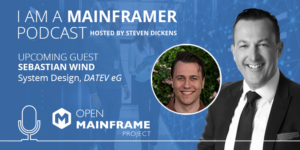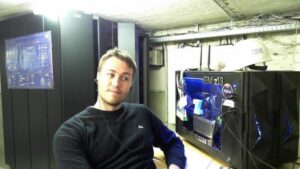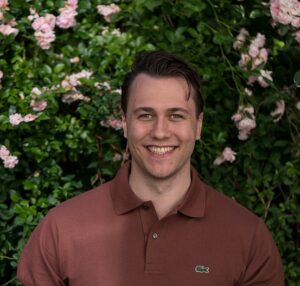In today’s episode of the “I Am A Mainframer” podcast, Steven Dickens sits down with Sebastian Wind, System Design at DATEV eG. On this podcast, Sebastian discusses his journey with the mainframe, the Open Mainframe Intern Program, becoming an IBM Champion, and where they see the Mainframe going in the future.

Steven Dickens: Hello and welcome. My name’s Steven Dickens, and you’re listening to the I Am A Mainframer podcast from the Open Mainframe Project. The Open Mainframe Project is a Linux Foundation collaborative project, and we’re focused on driving the adoption of Linux and open-source on the mainframe platform. I’m joined today by my dog in the background, but also by Sebastian Wind who studied at the University of Leipzig and IBM champion. I’m looking forward to this conversation. Welcome to the podcast, Sebastian.
Sebastian Wind: Hey, welcome.
Steven Dickens: So, Sebastian, just to help the listeners out, if you could maybe give us a brief introduction and a view into your background, that would really help us out here to get started.
Sebastian Wind: Of course, I studied at the University of Leipzig and I was also an intern of the Linux Foundation and I focused on enterprise computing and we also had a real mainframe at our university. So we could play around with the hardware and everything, and that’s what made me enthusiastic about mainframes in general.
Steven Dickens: Sebastian, that’s really interesting. Tell us a little bit about your first experience. The University of Leipzig’s a fantastic university that’s worked with us for a number of years. Just give us your sort of first exposure to the mainframe and tell the listeners your logging on to a screen for the first time. Talk us through maybe that experience a little bit.

Sebastian Wind: Yes, our professor told us about mainframes in the first year, and I was always curious about those machines that run large banks and stuff like this because I was quite sure that it couldn’t be some computer like the one that I had. It couldn’t be something like this because it always crashed, and that’s what made me interested. And well, the first time when I looked on and I saw the screen, I thought, “This is like it’s a joke or something? It looks weird.” And I didn’t realize that this is it like this is the real thing. That most people work on it and how powerful it actually is. I didn’t realize that.
Steven Dickens: So just you’re logging on probably to a 3270 screen, what was that first few moments? Was it really that unusual to what you’d seen? Was it Linux? Was it z/OS? Just maybe tell us a little more.
Sebastian Wind: It was z/OS. z/OS, yes.
Steven Dickens: So, you were logging on via a 3270 onto the mainframe? How did that kind of [crosstalk 00:02:58]?
Sebastian Wind: Well, I was used to very graphical applications and stuff like this, and the better it looked, the more advanced it is. That’s the mindset you have as a student, I guess. And this was like, it was pretty weird and all the controls were pretty weird too, but I managed to learn more about it and now I know most of the utilities.
Steven Dickens: And I think a lot of our Mainframe listeners will be aware of the journey you went on, but maybe if you could just explain a little for the maybe people who are listening to this develop mainframe experts, was that a two-hour journey, a two-day journey, a two-week journey, a two-year journey to become proficient on the mainframe? I think that would be interesting to get your perspective, somebody completely fresh to the platform coming on for the first time.
Sebastian Wind: Well, I started out with the courses at university and then I read about Master the Mainframe. And this was interesting for me because they claimed this would be like real-world challenges and stuff like this. I wanted to see if everything I’ve learned, is this the real stuff? I wanted to see if this is the real challenge, what they teach me. And I started out to be quite successful and it was first for the German, Austria, Switzerland region two times, and then became a global winner in 2017. So it was basically I guess two years.
Steven Dickens: So talk a little bit through that Master the Mainframe. I know a lot of people have come through that program but just give your experience. That’s obviously a big program that IBM runs to get college kids onto the platform, but just maybe elaborate because I know a lot of people listen to this, and then they’re considering whether to apply for that program. So maybe just give us your experience there.
Sebastian Wind:
Well, for me, Master the Mainframe was very important because I could see where my skills are. Like, can I be competitive with the rest of the new mainframe generation? And the whole experience was quite fun. It’s like a game, a little bit like a game, and you can develop your skills and read about it.
Steven Dickens: So maybe let’s get a little bit more current Sebastian. So you’ve come through Leipzig, you’ve come through the Master the Mainframe, talk us through that transition from doing the internship at the [inaudible 00:05:56]. So maybe let’s pause. You mentioned that you did the internship at the Open Mainframe Project. Can you maybe just elaborate on that a little first?
Sebastian Wind: Yeah, I applied for the internship and was… How can you say? Elected or something. Well, and then I was on the other side of like the mainframe, the Linux side, and I already knew about Linux of course, but the combination with the Mainframe was very interesting for me and I bought it over a monitoring tool and it was a great experience. I also got to Whittlebury through the program and I could give a short presentation about my internship there.
Steven Dickens: So you came through the internship program and then came out to the Guide Share Europe event in Whittlebury Hall in the UK?
Sebastian Wind: Yes.
Steven Dickens: And how did you find that community? I know that community personally, but how did you find mainframe was in the one place. How did you find that environment?
Sebastian Wind: It’s a great community and I’ve met Mark Wilson who’s a great guy and all the other people. So it was a really good trip for me. And through the trip, I also met Wolfram Greis and I joined his European Mainframe Academy and did a trainee course there. So it was awesome.
Steven Dickens: So then you’ve come through the University of Leipzig. You’ve done an internship at the Open Mainframe Project. You’ve been to a big community event where there are 500 mainframe people. You’ve kind of established your role in that community and got onto some of the programs. You’ve done Master the Mainframe, talk us through then as you’re moving from being a student into the workplace, how that worked out for you?
Sebastian Wind: Well, I saw a lot of Mainframe customers in Germany and also visited them through the European Mainframe Academy because they have the onsite meetings always at mainframe customer sites. So I looked around and I was wondering who’s the best workplace. And then I also met guys from data and they are very innovative, they have always the latest stuff on the mainframe and that’s how I got in.
Steven Dickens: So give our listeners a view of what you’re doing from [inaudible 00:08:40] now and what your day to day role looks like and really what your transition from being a student into the workplace has looked like.

Sebastian Wind: Well, it was almost seemingly because I did my master thesis at finance informatics in the Db2 Group. So I worked there already and then moved to Nurnberg and giant data and there I have multiple projects. And they are also very interesting because on the one side we have that batch scheduling system for the payrolls, which is z/OS and more like the traditional mainframe workload. And then we also have projects on the Linux side, we try to set up an open build service from SUSE and get our containers maybe on every platform we want. One of those platforms is also the mainframe, of course.
Steven Dickens: So it’s interesting you talk about the containers piece. I think that’s becoming a more and more relevant conversation as we see people look to deploy more cloud native applications on the platform. What’s been your experience with that particular realm of technology on the mainframe?
Sebastian Wind: Yeah, I think we have pretty much… We try to get the platform in a good position inside the company and that this is one essential thing to get done and that’s maybe also… I hope it will be a huge part of the future of the mainframe platform in our company.
Steven Dickens: Sebastian, tell me a little bit about what you’re doing with deploying containerized workloads on the platform, and how you deploy those, how’s that working out for you?
Sebastian Wind: Well, at the moment we deploy those containers on x86 hardware and there are no plans yet to get other platforms involved too, but we hope to get the flexibility and to do this in the future.
Steven Dickens: Okay. So tell me a little bit about what it means to be an IBM champion. That’s not something we hand out easily. So just maybe give me a perspective of how you got engaged in the program. What that means, what you’re doing to advocate. It would be really good to hear a little bit more so the listeners can understand that program.
Sebastian Wind: So the reason I am IBM champion is that I’m very much involved in mainframe education. So one major thing in the mainframe world is that we need new skills and new people to join us. And I’m connected to the universities and create courses and care for their systems and try to teach interested students and also to get them in the mainframe business to give them new opportunities. And therefore we have the Academic Mainframe Consortium, and this is a group of mainframe customers and universities who are engaged in this field and who are helping us with, for example, with mainframe hardware. So we are getting one z12 enterprise-class for Leipzig at the moment from T-Systems and I’m organizing the mainframe swap now and try to install it.
Steven Dickens: So thank you for your efforts. I think the community would thank you for… It sounds like you’ve been on that journey, you’ve been the recipient of help from the community it’s managed to help you get a job and build a career. And now you’re trying to pay that back into the community to help others come through. Would that be a good summary of-
Sebastian Wind: Yes.
Steven Dickens: So Sebastian, I think that’s been fantastic. There are some really interesting points there. One of the other things I always like to ask of the guests on the show is as you look forward still at the early part of your career, where do you see the mainframe three years, five years, maybe you’re lucky to maybe think 10 to 15 years from now, where do you see the business going? Where do you see the technology going and really what gets you excited about?
Sebastian Wind: Well, for me as an enthusiast, I would always host my stuff on the mainframe like if I had the cash or something, but the business side in the company, it is tough. We have to position the mainframe in a good way to get a new workload on it. And the competition from other offers is quite hard, and it’s all about to integrate the mainframe inside those heterogeneous IT landscapes, I guess.
Steven Dickens: So would you see there’s any particular technologies or things that you’re interested about that you think are going to be coming to the mainframe over the next few years that you’d maybe call out as being particularly interesting? I appreciate that’s a tough question. It’s late on a Friday afternoon for you here in Germany. So I’m asking you the tough-
Sebastian Wind: Well, no it’s okay. I think the mainframe still has some advantages already inside it that other platforms cannot offer, at least not in the quality the mainframe can. So I wait for IBM to deliver, I guess.
Steven Dickens: So let me maybe ask the question a different way. If you could have one wish for a piece of technology on the mainframe, maybe what would it be?
Sebastian Wind: To install directly on the hardware not [inaudible 00:16:22] anymore, but I guess it’s a bit weird, but I would like to have the last 10% of performance again.
Steven Dickens: Okay. That’s a good request. So maybe one final thing and you get to ask me a question. What would be your question that you would ask me?
Sebastian Wind: Okay. Can you unlock the z12 for Leipzig? It has a bad license on it.
Steven Dickens: I can ask and I can go and have that conversation. I’m happy to do that. I was thinking more generally, I’m happy to help with that one, Sebastian, but maybe a more general one that would inform the listeners. I’ll take that one as a specific one as an IBM but I’m happy to help. We do everything we can to support our community. But maybe if you’ve got more general question, you’d ask me? That’s a tough one, right?
Sebastian Wind: Yeah. I mostly have very specific questions.
Steven Dickens: I think we’re going to end up having a conversation after we finish the podcast. But now, is there anything that you’re interested to know or see that maybe I can help with?
Sebastian Wind: Well, I guess, no. I just have specific questions. I would ask like we use Cloud Foundry, can we get a proper port to Linux on Z?
Steven Dickens: So that’s an interesting one. A lot of the cloud tooling is an emerging space for us on the platform. So I think, yes, there’s some good work going on in that space. And maybe I can connect you to some people in the community who are doing that work. One of our platinum sponsors agents is SUSE and there’s a gentleman there and SUSE called Mike Friesenegger, Mike’s a fantastic platform advocate. And if you don’t know Mike, he would be somewhere I would direct you. There’s also one of our distinguished engineers from an IBM side who chairs the Technical Advisory Committee, gentlemen called Ingo Averdunk, if you don’t know either of those gentlemen, I’m happy to connect you, Sebastian. And I think you’re certainly asking the right type of question around Cloud Foundry and where we’re going with cloud tooling on the platform. So I can get you connected to both of those guys.
Steven Dickens: So Sebastian, this has been a fantastic journey. I think you’re a poster child for how we want to bring new people onto the platform. You’ve come through some of the programs you’ve done the internship from the Open Mainframe Project. You’ve done the academic initiative, Open Mainframe Project at IBM, Master the Mainframe Project that the team does. You’ve gone and built a career in industry and in paying that back. And I think that’s a fantastic story. So I’d like to thank you for joining us on the call today. That’s been really interesting.
Sebastian Wind: Yes. Thank you.
Steven Dickens: So you’ve been listening to the I Am A Mainframer podcast from the Open Mainframe Project. If you’d like to listen to more episodes like this, please go into the section below click and subscribe takes you a couple of minutes to write a review also. And we’d appreciate those as we try and build a fan base here for the I Am a Mainframe Project. My name’s Steven Dickens. It’s been great chatting to Sebastian today and we’re signing off. We look forward to speaking with you on the next episode.